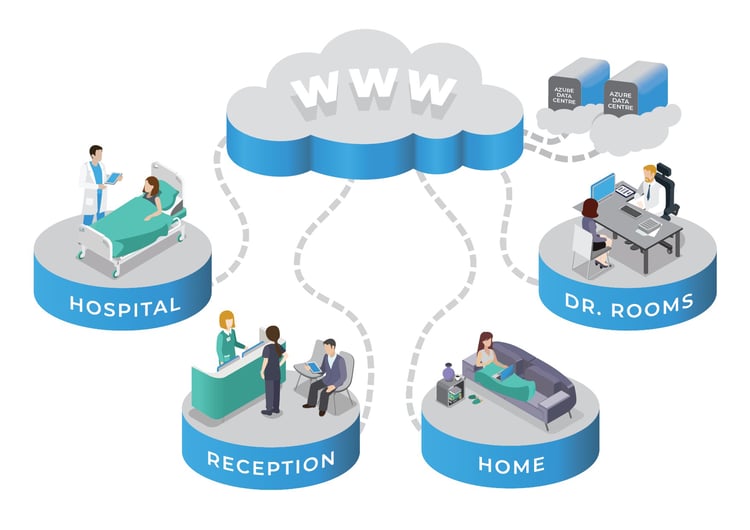Data security in healthcare is a widely discussed topic in the Australian media and, with the launch of My Health Record and advancements in information being stored digitally, as healthcare professionals, we are becoming increasingly cautious in order to protect the data of our employees and patients.
In our profession, we are entrusted with highly sensitive and extensive data about your practice and your patients and have the obligatory responsibility of keeping this information confidential. Whilst cloud storage has been historically viewed as less secure than traditional IT systems, say 10 or 20 years ago, today it is the most robust and secure option for healthcare practitioners. Despite this, however, there are still many myths and questions encompassing cloud security risks.
It can be particularly challenging to navigate the information available on cloud technology. That’s why we will be looking into the most common myths and misperceptions regarding cloud technology, through the lens of the healthcare industry, and show you why cloud computing in healthcare is the most secure solution for your practice.
Firstly: What is cloud technology and what are the benefits?
Cloud technology is the delivery of computing services through the Internet (also known as “the cloud”). Cloud services can include data storage, software, servers or intelligence, and offers faster and more flexible access to online resources.
Whilst there is an abundance of cloud services available, even within the healthcare industry, the one model that most businesses use is Software as a Service (SaaS) platforms. Rather than storing files and programs locally on a computer, users access SaaS applications (such as Clinic to Cloud) through an Internet browser or application in order to perform any jobs or tasks to be done.
SaaS applications are habitually more convenient to access than traditional software applications as everything is stored digitally and can be accessed securely via multiple devices at any moment, regardless of location. They are also more flexible; typically offered in tiered subscriptions based on the number of active users, the amount of data needed, or the type of services offered, which, in the healthcare industry, allows practices to easily scale their software needs with growth.
Now that we have a deeper understanding of what cloud technology is, we are going to bust some of the most circulated myths circulating the industry about cloud technology, using Clinic to Cloud and the healthcare industry as examples.

The Myths
1. If I upload my data, I will risk losing control of it (or losing it altogether)
Because Clinic to Cloud’s data is stored online, rather than locally, many practitioners are concerned that practice or patient data could get lost completely or, if the data is backed up, it could be accessed by another user on another platform or country. For healthcare providers, storing data is paramount as you need to maintain detailed historical medical records for your patients whilst ensuring these remain confidential.
Not all cloud technologies are created to be equal or direct competitors. The main difference; good SaaS applications use enterprise-grade cloud computing providers to ensure that data is stored locally and backed up securely. Providers such as Microsoft Azure, which is used by the Clinic to Cloud platform, have data redundancies set in place so data is duplicated and stored across multiple sites in Melbourne and replicated in realtime to Sydney. Data on Clinic to Cloud is also backed up every minute of every day, almost eliminating the risk of losing valuable information.
On top of this, when your data is uploaded onto the cloud, it is encrypted and can only be accessed via the SaaS application with a specific encryption key. Typically this is your username and password and a third factor of authentication just like what banks use. Without this key, the files will not be viewable.
2. Hackers could get access to my data
There are hackers out there who try to steal data for malicious purposes. For every hacker trying to get information, however, there are ethical hackers employed by cloud providers to do “vulnerability testing” in order to identify any potential weaknesses platforms may possess before the real hackers do.
With Clinic to Cloud, your patient data is stored on a secure datacenter, and high-quality providers such as Microsoft Azure are regularly performing tests and threat assessments in order to be one step ahead of security threats to ensure the protection your information. Through the use of information found by these ethical hackers, cloud providers can update their services and defences accordingly to protect their users and data against these threats.
The biggest risk to your practice’s data, in fact, is largely under your control. According to Verizon’s Data Breach Investigations Report, 81% of all hacking breaches were carried out using stolen passwords or weak passwords. In addition, a State of Cloud Security report found that businesses suffered more from on-premises software breaches, where an employee clicked on a phishing link or downloaded a virus.
One of the best ways to protect your data in the cloud is to ensure that you have an employee security awareness program in place, which empowers your teams with information on how to set secure passwords and keep them safe, as well as identify any breaches in security, such as phishing attempts or scams via email.
Discover smarter practice management software, developed by GPs for GPs.
3. If I'm sharing my information online, anyone can see it
Another common misconception of cloud storage within the healthcare industry is that as soon as information is shared on the cloud, it’s visible to anyone and everyone. However, this is far from the truth; SaaS applications like Clinic to Cloud allow different permission levels for different users, meaning you can control who has access to information and who can edit or upload information. In the case of Clinic to Cloud, this means your patient’s data is only accessible to those who actually need it.
For practitioners, it is a historically accepted practice to send patient information via mail or USB due to a misconception that if patient data is uploaded online, it’s accessible by everyone. While email isn’t a secure medium for internal clinic communication and sensitive patient files, digital messaging services actually offer more protection for patient data, not less.
Secure messaging services such as Telstra Health’s Argus and Healthlink use a national cloud infrastructure that allows clinicians to safely communicate and exchange patient records. Not only does this allow for more efficient practice management and a higher quality of patient-centric care, but it also reduces the risk of confidential patient information getting lost in the mail or opened by someone other than the receiver, a USB getting corrupted by a virus, or data being wiped accidentally or intentionally.
The benefits of cloud computing in healthcare
As practitioners, it’s natural and responsible to question the security and safety of any new piece of technology. However, with advancements made in cloud technology over the years, SaaS platforms are a highly beneficial tool that:
- Help practices win time by reducing the need for paperwork, as everything is stored digitally
- Reduces the likelihood of misplaced or hacked files, with secure storage and messaging
- Ensures patient data is securely backed up to minimise the risk of losing information.
- Allows practices to assign permissions for patient data based on need, for enhanced security
- Provides scalability as your practice or patients grow, so you only pay for what you need
- Gives practice managers and physicians greater flexibility, as the application can be accessed.
- Allows for more collaboration: with practitioners and admin staff able to access the same data, they’re empowered with information to better and more quickly diagnose patients.
Over to you
Ultimately, cloud computing allows you, as healthcare providers, to deliver high-quality patient-centric care, spending more time on diagnoses, treatments and patient care rather than on paperwork. It also offers greater security for patient records, in compliance with the changing legal requirements around Australian data storage and access.
Cloud computing, together with a strong systems security policy, empowered clinic staff, and the right SaaS application, is a powerful technology that can transform your practice and benefit everyone from admin teams to practitioners and patients.




